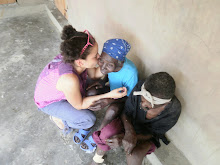Theater of the Oppressed is a form of theater started by a Brazilian director, Agusto Boal. Theater of the Oppressed presents a play in a variety of locations, from the street to a theater, that reflects a situation of oppression lived by the people of that area. Here in Jean Rabel a group of 7 women along with 1 man have journeying with me, exploring their realities to create a play that challenges spectators to change their reality. During this journey the group acted out numerous scenarios of oppression, opening my eyes to unspoken realities. In the beginning they didn´t know the definition of oppression, as soon as I explained the concept they recognized it. Every day they opened their eyes to more situations which they would act out and search for solutions, not through discussions, but by acting it out in the theater. There have been days when I have come home to cry after seeing the injustices and their reactions to them.
We created a piece which we plan to perform in the streets, in different communities, in different places of education that reveals the realities of the educational system here in Jean Rabel. The play highlights corruption in the administration and different ways students and parents deal with the system. The play lasts about 25 minutes and from that point on the audience begins to play. One of the actors, Ermithe, in this case, takes the role of the Joker. She invites the audience to become part of the piece to search for a solution to the injustice by entering the play as one of the oppressed characters. The spectator now becomes a spec-actor, a term coined by T.O. The audience member, or spec-actor, says what scene they would like to enter in and as what character. The actor who played the role in the play gives the spec-actor a part of their costume and the spec-actor begins to act out the solution with the other actors on stage. This continues until the audience decides that a solution has been found, or until they decide they are done. The practice of theater of the oppressed believes that the audience teaches the actors, as much as the actors teach the audience.
It becomes a game the audience wants to win, a game which reflects their lives, a game that may help them change their realities of oppression.
Last week, the group I have been working with decided that the play works wonderfully, but that there is no solution. I heard this slightly heartbroken because after all this time trying to motivate them to search for creative solutions, without violence, they threw in the towel with the play they created. I listened to them and told them, we could continue with the theater, but if they did not believe a solution could be found we would not perform the play for others. I explained that I didn´t say this as a threat, rather as a form of respect for the people of Jean Rabel. “If we go around performing the play without believing in a solution we are going around showing a reality they already now without giving hope of liberation. That is not theater of the oppressed. We can´t ask others to see hope for change if we ourselves are not willing to do the same.” I asked all of them to come up with one solution each for the following session. They did.
We plan on going through with the play; we will see what comes out of it. I pray that it motivate a few to dare to search for solutions and maybe plant seeds of hope in others.
With you,
Luisely
P.S.: If you have more questions, please ask, I’m more than happy to answer.
Wednesday, September 22, 2010
Subscribe to:
Post Comments (Atom)


Dear Luisely,
ReplyDeleteThank you, as always. I am so blessed to see how God is working in different ways in the people I know here and at home, and in and through you.
And you do not boast, you are humble in the vastness of the work you are doing.
So much love and so many prayers.
Love in Him,
Genny
It's very powerful. It would be wonderful if change could come quickly but, usually, it takes time, his time. God bless you and the people you love.
ReplyDelete